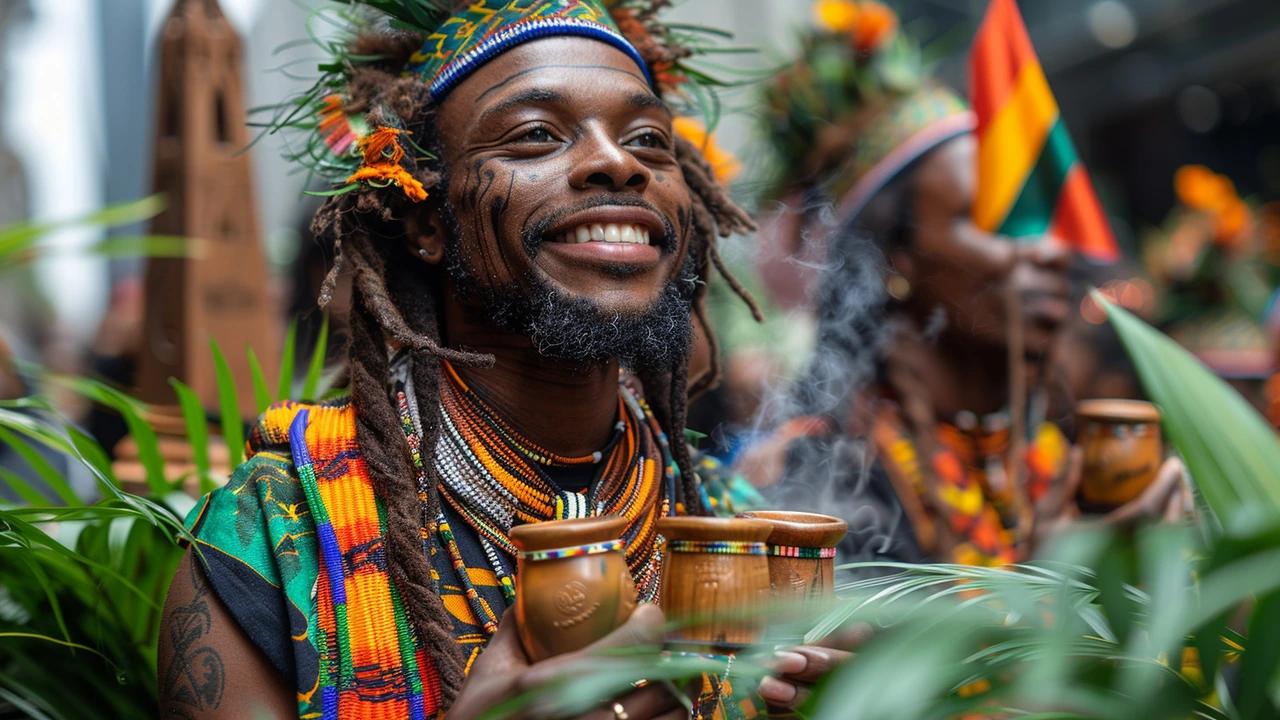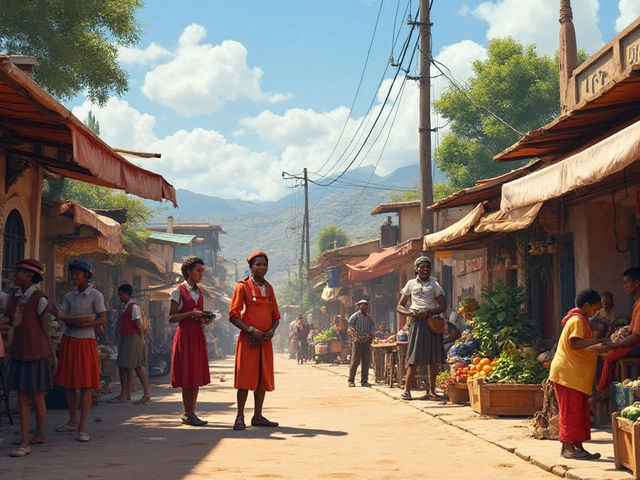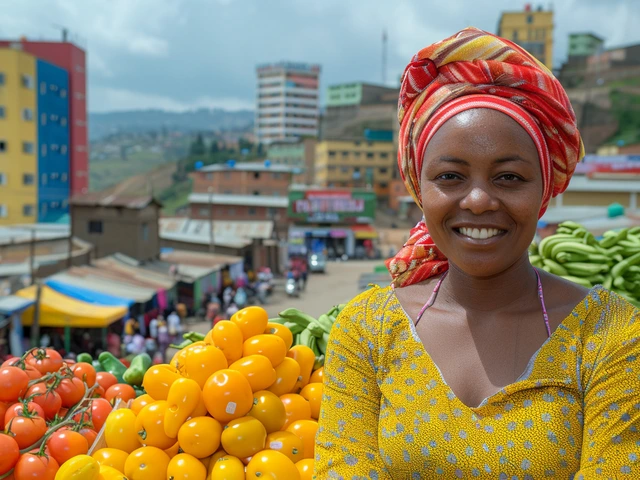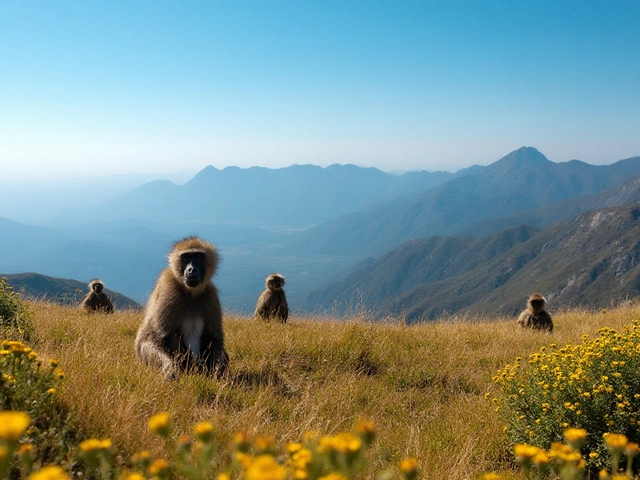When one thinks of Ethiopia, images of vast, scenic landscapes and ancient, majestic architectures often come to mind. However, Ethiopia's pride extends well beyond its visual allure. It encapsulates a rich historical narrative, a robust culinary heritage, deep-seated cultural diversity, and remarkable athletic prowess.
Historical Significance
Ethiopia, often described as the cradle of humanity, boasts an ancient history that traces back to the origins of human civilization. Archaeological findings, such as the famous Lucy, an Australopithecus afarensis discovered in the Afar region, provide evidence that modern humans might have walked these lands over three million years ago. This rich history continues with the establishment of one of the world’s oldest known kingdoms in Axum during the first century AD, which later became a major hub for commerce and culture connecting Africa and Asia.
The historical narrative of Ethiopia is also marked by its unique distinction of being one of the two African nations that maintained its independence during the colonial period. The Battle of Adwa in 1896, where Ethiopian forces triumphed over Italian invaders, remains a powerful symbol of resistance and pride. Ethiopian heritage is further enriched by its status as a site of early Christian culture, dating back to the 4th century, making it one of the earliest nations to officially adopt Christianity.
The medieval rock-hewn churches of Lalibela, carved from living rock, serve not only as a testament to architectural innovation but also as a pilgrimage site for scores of Christians annually. These churches, attributed to King Lalibela who sought to create a new Jerusalem in the 12th century, are an enduring legacy of Ethiopia's intricate history in both religious and cultural spheres.
Culinary Delights
Embarking on a journey through Ethiopian cuisine is akin to uncovering a vibrant tapestry of flavors and traditions that are closely tied to the nation's rich history and cultural heritage. The cornerstone of Ethiopian dining is Injera, a spongy sourdough flatbread made from teff flour. This unique bread doesn't just serve as a staple food; it's also a utensil, as pieces of injera are used to scoop up various stews and dishes. Among these, the most famous is Doro Wat, a spicy chicken stew, which is often accompanied by boiled eggs and considered a national dish.
What makes Ethiopian food truly stand out is its intricate combination of spices and seasonings, particularly Berbere and Mitmita. These spice blends not only add depth to each dish but also resonate with the country's history of spice trade. It's not uncommon to find meals in Ethiopia that invigorate the senses with their bold flavors and aromatic qualities. The vegetarian dishes, such as Misir Wat (lentil stew) and Shiro Wat (chickpea stew), are equally celebrated, making the cuisine highly inclusive and varied.
Let us not forget about the coffee ritual, an integral part of Ethiopian culture. Coffee, believed to have been discovered in Ethiopia, is not merely consumed but celebrated through elaborate ceremonies that foster community and hospitality. This ritual includes roasting coffee beans, grinding them, and slowly brewing the coffee in a pot known as a 'jebena'. The ceremony is typically conducted with the beautiful accompaniment of storytelling and sharing, further entrenching it into the societal fabric.
Exploring Ethiopian cuisine offers a deeper insight into the country's communal lifestyles and its connection to food, which is much more than sustenance but a reason for gathering, a cause for celebration, and a way to express cultural identity.
Linguistic and Cultural Diversity
Ethiopia is often hailed as a mosaic of cultures and languages, embodying an astonishing diversity that is rare to find anywhere else in the world. The nation is home to over 80 ethnic groups, each with its own distinct language, tradition, and customs. This vibrant diversity is not merely a source of pride for Ethiopians; it plays a crucial role in shaping the national identity of the country. Among these groups, the Oromo and Amhara are the largest, but smaller communities such as the Sidama, the Gurage, and the Welaita also contribute significantly to the cultural patchwork.
The linguistic landscape of Ethiopia is equally fascinating. With more than 80 languages spoken across the country, Ethiopia is a hub for linguistic scholars and enthusiasts alike. Amharic serves as the national language and is widely spoken, but other languages like Oromiffa, Tigrinya, and Somali are also prevalent. This polyglot nature extends beyond mere communication; it enriches the cultural practices, narratives, and philosophies of the people, weaving a richer tapestry of national culture. The Ethiopian script, Ge'ez, is one of the oldest alphabets still in use in the world today, further highlighting the country's deep historical roots.
Moving from language to cultural practices, Ethiopia's religious celebrations and ceremonies offer a window into its soul. Timket, the Ethiopian Epiphany, showcases elaborate rituals and vibrant processions that are attended by thousands, reflecting the strong Orthodox Christian heritage. Similarly, the Meskel festival, commemorating the discovery of the True Cross, is marked by bonfires and communal festivities, drawing participants from various ethnic backgrounds, fostering a sense of unity and national pride. The Islamic celebrations of Eid al-Fitr and Eid al-Adha are also observed widely, illustrating the religious diversity of the nation.
In addition to religious festivities, traditional Ethiopian music and dance play a pivotal role in cultural expression. Each ethnic group boasts its own unique style of music and dance that tells stories of their community, their struggles, and their joys. The Eskista, a traditional Ethiopian dance famous for its intense shoulder movements, is a sight to behold and is deeply emblematic of the country's cultural vitality. Whether through the rhythmic beats of the kebero drum or the melodic strings of the krar, music is an essential thread in the fabric of Ethiopian life.
"Ethiopia's cultural diversity is a living, breathing force that shapes not only its present but also its future," noted by a cultural anthropologist from Addis Ababa University.
Athletic Achievements
When it comes to sports, Ethiopia is synonymous with long-distance running. This tradition isn’t just a contemporary phenomenon but rooted deeply in the high-altitude terrains and the lifestyle of its people which naturally favor endurance athletics. The legendary status of Ethiopian runners began to crystalize globally with the Rome Olympics in 1960 when Abebe Bikila won the marathon barefoot. It was not only a dramatic scene but also a powerful signal to the world about the formidable spirit and stamina of Ethiopian athletes.
Since then, names like Haile Gebrselassie, Kenenisa Bekele, and Tirunesh Dibaba have become household figures in the world of distance running. These athletes are not only celebrated for their Olympic medals but for the way they've consistently shattered world records. For instance, Haile Gebrselassie, who has held two Olympic gold medals, has broken over 20 world records in his career, emphasizing Ethiopia’s dominance in long-distance events. The stories of their training, running in the rugged, breath-taking landscapes of the Ethiopian Highlands, inspire many young athletes around the globe.
The passion for running is matched by the national pride it incites. Events like the Great Ethiopian Run, which is Africa’s biggest road race, attracts over 45,000 participants and is a festivity of endurance and communal spirit. This event not only highlights athletic prowess but also unites people in a celebration of health, stamina, and national pride. The streets overflow with waves of green, yellow, and red, as locals and foreigners alike partake in this high-spirited marathon.
The success of Ethiopian athletes on the international stage has been a catalyzing agent for the country's youth. Many young Ethiopians see athletics as a pathway to transformation and global recognition. The government and various sports organizations provide support to training camps especially designed for young athletes, demonstrating the integral role of sports in socio-economic development. These programs aim to harness natural talent and nurture it into world-class athletic prowess, ensuring the legacy of Ethiopian sportsmanship continues into the future.

 Why PayPal Isn't Available in Ethiopia: A Comprehensive Guide
Why PayPal Isn't Available in Ethiopia: A Comprehensive Guide
 Understanding the Minimum Hourly Wage in Ethiopia: Insights and Facts
Understanding the Minimum Hourly Wage in Ethiopia: Insights and Facts
 Exploring the Wealthiest Regions of Ethiopia: A Closer Look at the Country's Most Prosperous Areas
Exploring the Wealthiest Regions of Ethiopia: A Closer Look at the Country's Most Prosperous Areas
 Why Ethiopia is a Must-Visit Destination: Culture, History, and Natural Beauty
Why Ethiopia is a Must-Visit Destination: Culture, History, and Natural Beauty
 Bringing Cash into Ethiopia: Limits and Tips for Travelers
Bringing Cash into Ethiopia: Limits and Tips for Travelers
Pauline Herrin
May 13, 2024 AT 21:13While the overview admirably enumerates Ethiopia's multifaceted heritage, the prose suffers from a conspicuous lack of analytical depth. The emphasis on historical milestones appears to be a mere recitation rather than a critical examination of their contemporary relevance. Moreover, the culinary section glosses over regional variations that are essential for a nuanced understanding. The discussion of linguistic diversity, though factually correct, fails to engage with the sociopolitical complexities inherent in multilingual policy. In sum, the article reads like a celebratory brochure rather than a rigorous scholarly contribution.
pradeep kumar
May 20, 2024 AT 20:33Ethiopia's athletic narrative is undeniably impressive, yet the article neglects the systemic challenges athletes face beyond medal counts. It also overlooks the gender disparity evident in sponsorship opportunities. The piece could benefit from acknowledging these structural issues. Overall, the tone feels overly reverential.
love monster
May 27, 2024 AT 20:36The gastronomic exposition rightly highlights injera as both staple and utensil, a duality that exemplifies functional food design. From a culinary science perspective, the fermentation of teff introduces lactic acid bacteria that enhance digestibility and micronutrient bioavailability. Moreover, the incorporation of berbere aligns with capsaicin-mediated thermogenesis, offering metabolic advantages. It is encouraging to see such detailed attention to sensory profile and cultural praxis within the same narrative.
Christian Barthelt
June 3, 2024 AT 20:40There is a minor grammatical slip in the sentence “Ethiopia's pride extends well beyond its visual allure,” where the possessive apostrophe is correctly placed, but the subsequent clause would read more fluidly as “extends far beyond its visual allure.” Additionally, the claim that Ethiopia is “one of the two African nations that maintained its independence” dismisses the nuanced status of Liberia, which, despite its own complexities, also avoided colonization. While the celebration of historical victories is warranted, a more balanced historiography would also address internal conflicts that shaped the nation.
Ify Okocha
June 10, 2024 AT 20:43The article presents a sweeping panorama of Ethiopia's cultural wealth, yet it conspicuously omits the pressing socioeconomic disparities that continue to affect marginalized groups.
For instance, while the rock‑hewn churches of Lalibela are praised for their architectural brilliance, the surrounding communities often grapple with inadequate infrastructure and limited access to clean water.
The narrative glosses over the fact that many rural regions rely heavily on subsistence agriculture, exposing them to climate volatility.
In the culinary segment, the emphasis on injera and doro wat neglects the dietary challenges faced by low‑income households who cannot afford meat or even teff.
The piece also fails to acknowledge the gendered labor divisions that persist in both domestic cooking and agricultural production.
Furthermore, the discussion of linguistic diversity omits the political tensions that arise from language policy implementation, especially in education.
While the celebration of athletic achievements is inspiring, it sidesteps the reality that many young runners train under austere conditions with minimal medical support.
The Great Ethiopian Run, touted as a unifying event, also highlights disparities in sponsorship that favor elite athletes over grassroots participants.
Moreover, the article does not address the environmental degradation linked to deforestation for fuel, which threatens both cultural sites and livelihoods.
The neglect of these critical issues creates an imbalanced portrayal that leans heavily toward romanticization.
It is essential to integrate these socioeconomic dimensions to offer readers a holistic understanding.
The omission of such complexities may inadvertently perpetuate a mythic image that overlooks lived experiences.
A more rigorous analysis would juxtapose heritage celebration with the ongoing challenges that shape contemporary Ethiopian society.
Ultimately, acknowledging both triumphs and tribulations would enrich the discourse and foster a more authentic appreciation of Ethiopia's multifaceted reality.
Such an inclusive approach would also empower policymakers to address inequities more effectively.
Only then can the celebration be rooted in reality rather than idealization.
William Anderson
June 17, 2024 AT 20:46The melodramatic lament presented above, while theatrically appealing, borders on hyperbole. Elevating each omission to catastrophe diminishes the genuine achievements already outlined. A balanced critique would commend the successes while urging incremental reforms. Nonetheless, the passion for justice is commendable.
Sherri Gassaway
June 24, 2024 AT 20:50One might contemplate that Ethiopia's mosaic of cultures serves as a microcosm of humanity's collective consciousness. The interweaving of languages resembles a symphonic dialogue where each voice, however distinct, contributes to a greater harmony. Yet, this harmony is perpetually contingent upon the willingness to listen. In that sense, cultural diversity is both a blessing and a responsibility.
Milo Cado
July 1, 2024 AT 20:53It is heartening to witness how Ethiopia's rich tapestry of history, cuisine, and sport continues to inspire both locals and the global community 😊. The celebration of such heritage fosters cross‑cultural dialogue and mutual respect 🌍. By highlighting these achievements, we encourage a more inclusive world narrative. Keep sharing these stories-every positive note adds to the chorus of understanding! 🙌
MONA RAMIDI
July 8, 2024 AT 20:56This glorified hype completely ignores Ethiopia’s real problems.